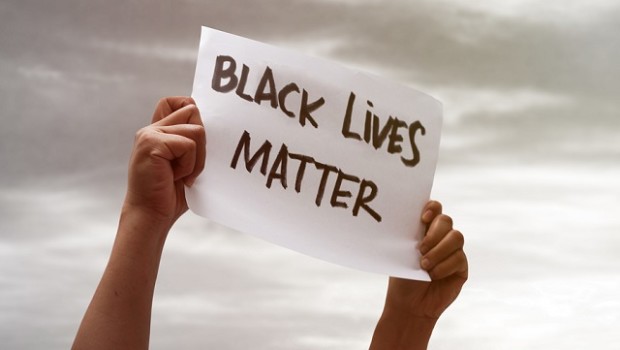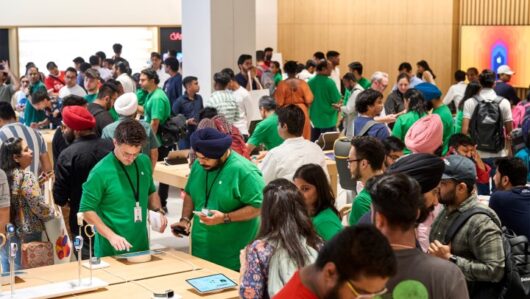
Cotton On, Aesop, The Iconic, Lush, Camilla and Quay are just some of the Australian businesses that have posted messages of support for the Black Lives Matter movement following the death of African-American man George Floyd in police custody last week.
The tragedy has sparked sweeping protests across the US and around the world nearly seven years after the hashtag #BlackLivesMatter was first used in response to the acquittal of George Zimmerman in the shooting death of African-American teenager Trayvon Martin.
It has also prompted companies to speak out against racism and inequality.
Aesop on Tuesday shared the names of nine African-American men, women and children who had been killed in recent years, in most cases by police officers, and said it would donate US$100,000 to organisations that fight racial injustice and promote opportunities for black people.
“If systematic racism is to be defeated, we all need to stay educated, become involved and understand our role in both the problems, and the solutions,” the skincare brand wrote in an Instagram post.
Cotton On said on Instagram that it has a “duty” to use its influence and community to speak out against racism, hatred and injustice.
“We stand for equality. We stand for change #BlackLivesMatter,” the fast fashion giant wrote.
Quay wrote that there is “no neutral position on racism” and said it would donate a total of $150,000 to organisations that support the fight against racial injustice by the end of the year.
“We believe the only way to fight racism is to be actively anti-racist – educate yourself, speak up, donate, take action,” the popular sunglasses brand said on social media.
Aesop, Cotton On and Quay all have a significant presence in the US, but even local retailers that don’t target US customers, such as The Iconic, issued statements.
“It’s not OK,” the online retailer said on Instagram on Monday.
“As a diverse organisation that is made up of people who care, we are not ok with what happened to George Floyd this week.”
These posts have garnered thousands of likes and largely positive comments, with one commenter writing in response to Aesop: “Makes me feel proud to buy your products. Thank you.”
But not all corporate messages have been welcomed, with some consumers calling out brands for not taking meaningful action, or worse, seeking good PR when actually they’re part of the problem.
P.E Nation’s post on Instagram, which called for equality but did not explicitly refer to the Black Lives Matter movement, was harshly criticised.
“This is a lazy PR post,” one person commented.
“[T]his is by far the most disappointing post by a retailer that I have seen in the midst of this situation,” wrote another, who identified herself as a black woman and a P.E Nation customer.
Zimmermann also saw pushback on its message of support for the Black Lives Matter movement.
Some commenters on Instagram pressed the luxury brand about the lack of diversity in its marketing campaigns, and one person accused the brand of turning a blind eye to a staff member’s racist remark.
Honey Birdette shared its desire to “do better” and pledged to support The Loveland Foundation, which supports black women and girls, and the National Aboriginal and Torres Strait Islander Women’s Alliance, but was also called out for lack of diversity in its campaigns.
Let’s be clear, this is all about marketing
Louise Grimmer, a senior lecturer at University of Tasmania’s business school, said these responses are to be expected.
“For many brands weighing into controversial topics would be a strategy that would be an unexpected and perhaps even an unwelcome move for their customers,” the marketing expert told Inside Retail.
“If a brand has a track record of taking a stand on controversial issues, and there are many that do, then I think that sort of approach sits more comfortably with consumers. Otherwise I think this sort of marketing, and let’s be clear this is all about marketing, rings rather hollow.”
Abas Mirzaei, a senior lecturer at Macquarie University who has been studying ‘woke’ marketing campaigns for the past two years, agreed that brands should think about what they’re doing internally before making public statements.
“How many of your employees or directors on your board are people of colour? If you have a list of 20 white people out of 20, and then you want to have a conversation about racism, you’re going to face questions,” he said.
According to a report cited by Business of Fashion, the earned media value of the Black Lives Matter hashtag rose from $173,000 to $63.5 million over the course of the past week.
The financial benefit of aligning a brand with this movement is not lost on consumers, who are quick to denounce corporate campaigns and statements they view as opportunistic.
Mirzaei’s research shows there is one factor that ‘neutralises’ this critique.
“If brands are prepared to make a sacrifice – a proper, reasonable financial sacrifice – they’ll neutralise the corrupt motivation argument,” he said, referring to Nike’s decision to feature ex-football player Colin Kaepernick in a series of campaigns, which led to consumer boycotts.
What about racism in Australia?
Australian brands that have spoken out about racial injustice in recent days have also faced questions about what they’re doing to fight racism locally and why it took a movement in the US for them to say something.
The Iconic acknowledged the validity of these questions.
“The horrific scenes coming out of the US forced us to reflect, and it reminds us how little our country recognises its own injustices and deaths in custody of our Aboriginal and Torres Strait Island people,” the company wrote in an email to Inside Retail.
“Staying silent is being complicit, and we have a responsibility as humans to do better – to be better – and be a part of the change. That said, we don’t believe that we have the understanding or authority to speak more broadly on this topic without learning further ourselves, which is what we will be doing more of moving forward.”
Over the weekend, the local arm of Lush shared a statement from its US sister business about Black Lives Matter on Instagram, and added: “We aren’t immune to racism in Australia.”
Lush ANZ director Peta Granger told Inside Retail that, in the past, the company used its Charity Pot program and campaigned in-store and online for racial justice, but a few years ago, it started working with local organisations Democracy in Colour and SEED Mob.
“Businesses need to move beyond statements to show genuine solidarity and allyship through action and listening to people of colour with lived experience. We admit that we are late to the table and that, like society, Lush needs to change and do better,” Granger said.
Yatu Widders-Hunt, a director at Cox Inall Ridgeway, and founder of an Instagram account highlighting Indigenous fashion brands, welcomed the wave of support for Indigenous organisations in the wake of the Black Lives Matter protests, but cautioned that it must be genuine.
“I wouldn’t want to discourage anyone from supporting such an important movement. I do however think it’s a good opportunity for brands to reflect on their own values and think about the role they want to play in shaping our society and showing leadership,” Widders-Hunt told Inside Retail.
“Our communities are fighting every single day. I think we want to see consistency and honesty from brands and not feel like they are supporting something because it’s trending. It has to be genuine and part of who they are.”





